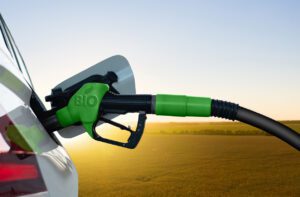Renewable fuel is a type of fuel that works like petroleum diesel but is better for the environment. As a green energy alternative, renewable fuel can be produced from used cooking oil and grease. Produced through a hydrotreatment process, HVO diesel that has a similar chemical composition to fossil diesel. As more and more companies look for ways to reduce their environmental impact, renewable fuel is becoming an increasingly popular fuel source. Learn more about how renewable fuel works and the future of clean energy from SeQuential and our parent company, Neste.
What Are the Benefits of Renewable Fuel?
Renewable fuel was first commercially manufactured in the 1990s and is now used around the world as an alternative to fossil fuels. The advantages of switching to renewable fuel include:

- Smaller carbon footprint: The transportation industry is a major source of climate-altering carbon dioxide emissions. But by switching to renewable fuel, fleet managers can significantly reduce their carbon footprint. According to the Alternative Fuels Data Center, switching from petroleum diesel to renewable fuel can lower carbon dioxide emissions by 65%.
- Air quality: renewable fuel is a clean-burning fuel, meaning it creates far fewer contaminants and releases less smog and particulate matter than other fuel sources. And because it is biodegradable, renewable fuel poses less of a threat to waterways than petroleum diesel.
- Sustainability: Rather than using harmful environmental practices to source fossil fuels, renewable fuel is made by recycling and refining used cooking oil. By creating fuel from a common byproduct of the restaurant business, the renewable fuel industry also helps keep cooking oil and grease out of the waste stream.
- Security: By increasing the domestic production of biofuels, the United States can take steps to reduce its dependence on foreign oil. At the same time, renewable fuel production helps boost the national energy economy since renewable fuel can be refined and produced from American products in American facilities.
- Ease of use: Renewable fuel can be used in any diesel engine without modification and has a higher cetane rating and better lubricity than petroleum diesel, it causes less wear and tear on your engine.
With so many positives, it’s easy to see why many companies and fleets are making the switch to clean energy sources. According to a report from the International Energy Agency (IEA), demand for biofuels is expected to increase by 28% in the next few years.
How to Use Renewable Fuel
When making the switch to renewable fuel, you should always ensure that your fuel blend meets the latest ASTM standards. Certain renewable fuel producers, including SeQuential, also complies with standards for the testing, blending, storing, and shipping of renewable fuel.
Some companies are hesitant to switch to renewable fuel because they worry it will be more difficult to handle and store. However, the guidelines for renewable fuel handling are comparable to those for petroleum diesel. SeQuential recommends the following best practices:
- Ensure storage tanks are free of water, sediments, and other contaminants.
- Minimize exposure to heat and sunlight, which can accelerate oxidation.
- Minimize exposure to oxygen, which can reduce storage life.
- In cold weather, use the same anti-gelling protocols as petroleum diesel.
- Use a winterizing agent when temperatures are below 25°F.
- Typically, renewable fuel should be used within six months of delivery.
- If renewable fuels will be stored long-term, use precautions such as stability additives.
Learn More About Renewable Fuel from SeQuential
Wondering where to find renewable fuel? At SeQuential, we work with retail food establishments across the United States, collecting and refining their used cooking oil to create renewable fuel. Our recycling service is free of charge, so commercial kitchens can be confident their used cooking oil and grease are handled properly without incurring an additional charge. SeQuential collects cooking oil from restaurants, hotels, college campuses, and more, and we also provide grease trap maintenance services.
For over a decade, we’ve been fueling vehicles with our BQ-9000 certified fuel, which is available at locations throughout Oregon. SeQuential partners with fleet managers, retailers, and distributors to make clean-burning biofuels more widely available. To become a fuel partner or learn more about our green energy solutions, contact us today.